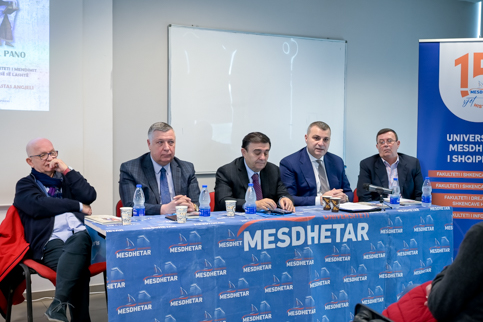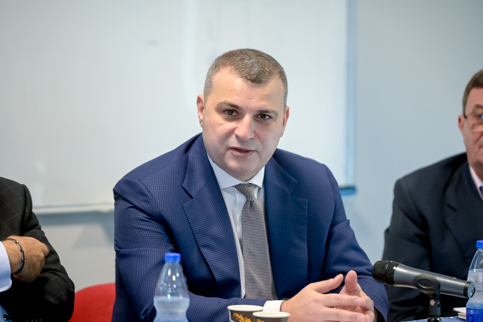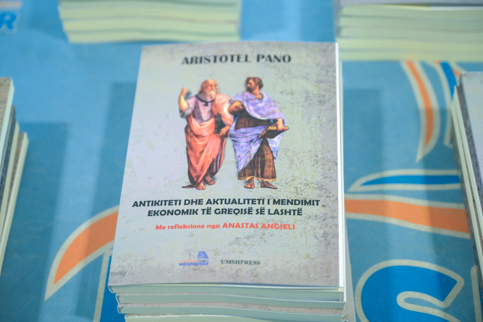BANK OF ALBANIA
PRESS RELEASE
Governor Sejko: Address at the promotion of the book by Prof.Dr. Aristotel Pano
Publication date: 04.04.2023
Honourable professors,
Dear participants,
Dear ladies and gentleman,
I have the honour and pleasure to participate in this utterly special promotion for me, as the Governor of the Bank of Albania, and as a friend and former student of Professor Aristotel Pano, who use to be one of the most elite collaborators and advisor to our central bank, since its foundation. Unfortunately, Professor Pano passed away last year, but as we see today and will continue in the future as well, the work of this prophylactic author remains an entire institution of creativity, still coming into the hands of the reader with new works. In this context, I have the honour to present the book “Antiquity and modernity of economic thought of the Ancient Greece”, written by Prof. Dr. Aristotel Pano, and enriched with reflections by Academic Prof Dr. Anastas Angjeli.

The theme on the economic thought and philosophy, addressed in this book, makes it important and almost unique for Albania, almost undealt with so far across domestic works. The ancient economic thought should be recognised and discussed. It remains valuable even today, for both students of this relatively new science and for us as policy makers.
The information and reflections in the pages of this work reveal that Greek antiquity show some of the earliest economic ideas and theories. Through the study of the economic thought in ancient societies, we can get a better understanding on the evolution of the economic thinking.

Professor Angjeli reveals his reflections on the work of Professor Panos with the well-known expression "History repeats itself", the longer you can look back, the further you can look forward. Studying ancient economic thought allows us to learn from the mistakes and successes of past economic systems. For example, the downturn of ancient economies, like in Rome and Greece, provides important lessons on the risks of unsustainable economic practices. Also, economic systems have always played a crucial role in shaping societies. By studying the economic thought of ancient societies, we can gain insight into how these systems impacted the political, social and cultural structures of those societies. The study of ancient economic thought can also inform us on the current economic policy. By analysing the economic practices of past societies, we can identify successful strategies that can be applied to modern economies. Overall, the study of ancient economic thought is important as it: offers a historical perspective on economic systems; helps us learn from past mistakes; and informs the current economic policy.

Also, we, central bankers, may learn a lot from the giants of antiquity discussed in this book. So, for example, the last chapter of the book shows how the work of the legendary thinker of Greek antiquity, Aristotle, is important for monetary policy. He was one of the earliest thinkers to analyse the nature and function of money. His ideas on money and economy have affected the economic thought for centuries, and many of his insights are still relevant today. One of Aristotle's main contributions to monetary policy is his understanding of the role of money in the economy. He recognized that money serves as a means of exchange, making it easier to trade goods and services. Aristotle also understood that money has value because people accept it in exchange for goods and services, introduced us to the potential dangers of excessive monetary expansion, and argued that if too much currency is put into circulation in the economy, it can lead to inflation and devaluation of the currency. This notion is still valid after more than 2,300 years, as even today central banks and governments carefully monitor the money supply to prevent inflation. In addition, the works of Aristotle reflected in this book, along with some other thinkers such as Plato, Homer, Socrates, etc., provide us with knowledge on the ethics of monetary policy. He argued that money should be used to facilitate trade and not for personal gain, and believed that those responsible for monetary policy should act with integrity and fairness, and prioritize the common good over their own interests.

Dear participants,
This book, written in a proficiency manner by one of the most important thinkers and economists of the 20th and 21st centuries, introduces us to the age-long legacy of the critical thought, with the first works of Greek Antiquity authors and the analysis found in these works. Professor Pano together with his ever-standing collaborator and student, Professor Angjeli, continue to highlight the importance of critical thinking in turn inspiring and challenging the nowadays researchers and thinkers. Their emphasis on the reason, the empirical evidences, and the rigorous debate, remains a crucial part of the intellectual and academic life.
Our Professor Pano enables us to understand how reflections from the past centuries, still give us lessons on the monetary policy, as they provide insights on the nature and function of money, the possible risks to the excessive monetary expansion and on the ethic of monetary policy. The young reader, by studding the philosophy addressed in this book, may learn and gain a deeper understanding on the role of money in the economy and policy makers can take more informed decisions on the monetary policy.
Allow me conclude by returning to the legacy that intellectuals like Aristotel Pano leave behind even when they leave life. I feel very glad that Professor Pano entrusted us his manuscript on the Albanian monetary and banking history in the last two centuries. The Bank of Albania will very soon publish this work. I hope that such works inspire the faculty of economics, finance and business to cover in their curricula more broadly the subject on the economic thought, as it provides a profounder comprehension of the economic theory, develops the ability of thinking and exposes students to both various ideas and the study of intellectual history.

 Twitter
Twitter
 Youtube
Youtube
 Facebook
Facebook
 Flickr
Flickr
 RSS
RSS
 Subscribe
Subscribe
 Feedback
Feedback